Donglin Xie
Simultaneous Polysomnography and Cardiotocography Reveal Temporal Correlation Between Maternal Obstructive Sleep Apnea and Fetal Hypoxia
Apr 17, 2025Abstract:Background: Obstructive sleep apnea syndrome (OSAS) during pregnancy is common and can negatively affect fetal outcomes. However, studies on the immediate effects of maternal hypoxia on fetal heart rate (FHR) changes are lacking. Methods: We used time-synchronized polysomnography (PSG) and cardiotocography (CTG) data from two cohorts to analyze the correlation between maternal hypoxia and FHR changes (accelerations or decelerations). Maternal hypoxic event characteristics were analyzed using generalized linear modeling (GLM) to assess their associations with different FHR changes. Results: A total of 118 pregnant women participated. FHR changes were significantly associated with maternal hypoxia, primarily characterized by accelerations. A longer hypoxic duration correlated with more significant FHR accelerations (P < 0.05), while prolonged hypoxia and greater SpO2 drop were linked to FHR decelerations (P < 0.05). Both cohorts showed a transient increase in FHR during maternal hypoxia, which returned to baseline after the event resolved. Conclusion: Maternal hypoxia significantly affects FHR, suggesting that maternal OSAS may contribute to fetal hypoxia. These findings highlight the importance of maternal-fetal interactions and provide insights for future interventions.
Federated Selective Aggregation for Knowledge Amalgamation
Jul 27, 2022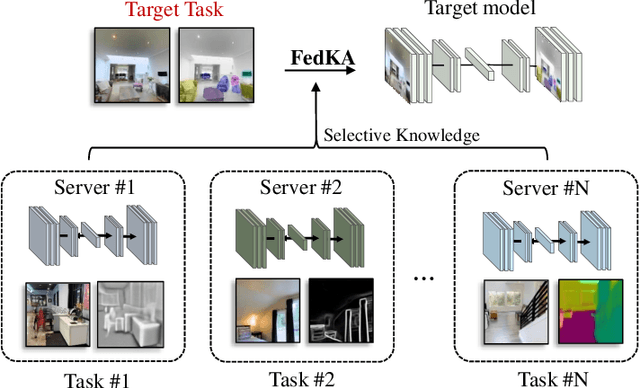

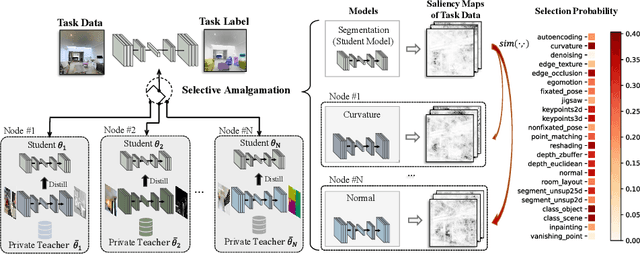

Abstract:In this paper, we explore a new knowledge-amalgamation problem, termed Federated Selective Aggregation (FedSA). The goal of FedSA is to train a student model for a new task with the help of several decentralized teachers, whose pre-training tasks and data are different and agnostic. Our motivation for investigating such a problem setup stems from a recent dilemma of model sharing. Many researchers or institutes have spent enormous resources on training large and competent networks. Due to the privacy, security, or intellectual property issues, they are, however, not able to share their own pre-trained models, even if they wish to contribute to the community. The proposed FedSA offers a solution to this dilemma and makes it one step further since, again, the learned student may specialize in a new task different from all of the teachers. To this end, we proposed a dedicated strategy for handling FedSA. Specifically, our student-training process is driven by a novel saliency-based approach that adaptively selects teachers as the participants and integrates their representative capabilities into the student. To evaluate the effectiveness of FedSA, we conduct experiments on both single-task and multi-task settings. Experimental results demonstrate that FedSA effectively amalgamates knowledge from decentralized models and achieves competitive performance to centralized baselines.
CADG: A Model Based on Cross Attention for Domain Generalization
Apr 07, 2022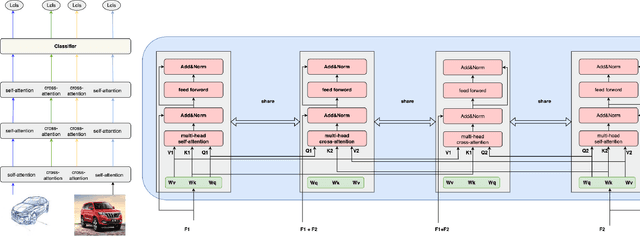
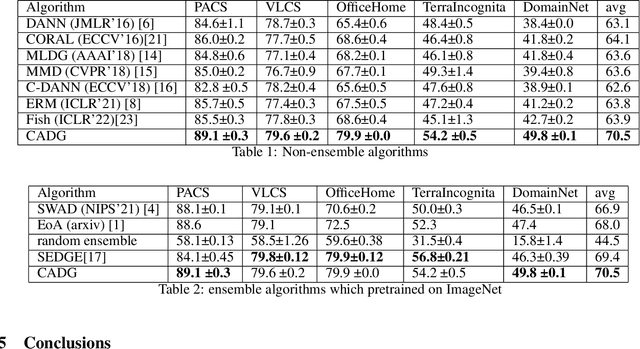
Abstract:In Domain Generalization (DG) tasks, models are trained by using only training data from the source domains to achieve generalization on an unseen target domain, this will suffer from the distribution shift problem. So it's important to learn a classifier to focus on the common representation which can be used to classify on multi-domains, so that this classifier can achieve a high performance on an unseen target domain as well. With the success of cross attention in various cross-modal tasks, we find that cross attention is a powerful mechanism to align the features come from different distributions. So we design a model named CADG (cross attention for domain generalization), wherein cross attention plays a important role, to address distribution shift problem. Such design makes the classifier can be adopted on multi-domains, so the classifier will generalize well on an unseen domain. Experiments show that our proposed method achieves state-of-the-art performance on a variety of domain generalization benchmarks compared with other single model and can even achieve a better performance than some ensemble-based methods.
Mosaicking to Distill: Knowledge Distillation from Out-of-Domain Data
Oct 27, 2021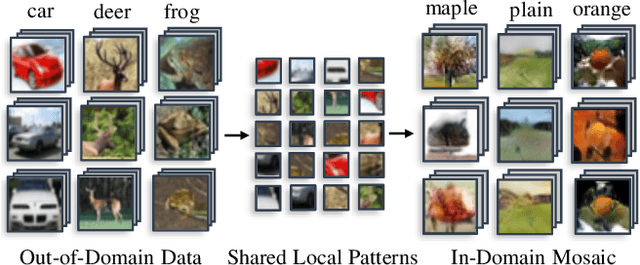
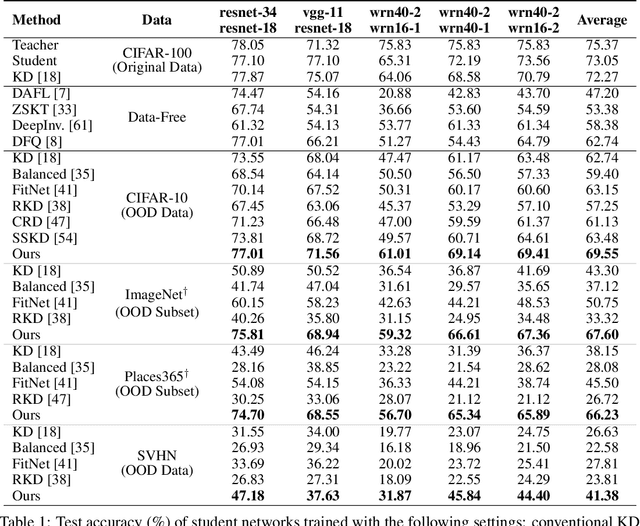


Abstract:Knowledge distillation~(KD) aims to craft a compact student model that imitates the behavior of a pre-trained teacher in a target domain. Prior KD approaches, despite their gratifying results, have largely relied on the premise that \emph{in-domain} data is available to carry out the knowledge transfer. Such an assumption, unfortunately, in many cases violates the practical setting, since the original training data or even the data domain is often unreachable due to privacy or copyright reasons. In this paper, we attempt to tackle an ambitious task, termed as \emph{out-of-domain} knowledge distillation~(OOD-KD), which allows us to conduct KD using only OOD data that can be readily obtained at a very low cost. Admittedly, OOD-KD is by nature a highly challenging task due to the agnostic domain gap. To this end, we introduce a handy yet surprisingly efficacious approach, dubbed as~\textit{MosaicKD}. The key insight behind MosaicKD lies in that, samples from various domains share common local patterns, even though their global semantic may vary significantly; these shared local patterns, in turn, can be re-assembled analogous to mosaic tiling, to approximate the in-domain data and to further alleviating the domain discrepancy. In MosaicKD, this is achieved through a four-player min-max game, in which a generator, a discriminator, a student network, are collectively trained in an adversarial manner, partially under the guidance of a pre-trained teacher. We validate MosaicKD over {classification and semantic segmentation tasks} across various benchmarks, and demonstrate that it yields results much superior to the state-of-the-art counterparts on OOD data. Our code is available at \url{https://github.com/zju-vipa/MosaicKD}.
 Add to Chrome
Add to Chrome Add to Firefox
Add to Firefox Add to Edge
Add to Edge